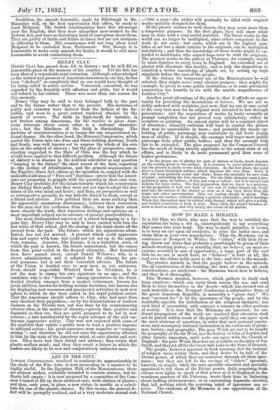HENRY CLAY.
HENRY CLAY has passed from life to history ; and he will fill an honourable place in the memory of his country. Yet his fate has been that of a remarkable semi-ostracism. Although acknowledged as the noblest and greatest of American statesmen in our day, he has been "shelved" so completely that no one would have thought of his being called to active service. Venerated, consulted, he was regarded by the Republic with affection andgle, but it would
not submit to his control. There was more one reason for this anomaly. not submit to his control. There was more one reason for this anomaly.
Henry Clay may be said to have belonged both to the past and to the future rather than to the present. His doctrines of polity and economy were derived from the fathers of the Re- public' and were to a great extent rendered obsolete by the march of events. The faith in high-tariff, for instance, is not broken among Americans, for the resolve to place Ame- rican interests above every other is a national character- istic; but the blindness of the faith is diminishing. The doctrine of nonintervention is no longer the one unquestioned na- tional dogma On the other hand, the Missouri Compromise, which parted the Union into two Free and Slave-holding portions North and South, was well known not to express the whole of his own idea on the subject of slavery ; but the plan of prospective eman- cipation suggested to the State of Ohio was the key which he would have applied to that difficult problem. Although the future of slavery is as obscure to the political calculator as any question "looming in the future," the most recent of the facts regarding it—the decline of Abolitionism, and the general acquiescence in the Fugitive Slave Act, odious as the operation is, coupled with the undoubted advance of " Free-soil" doctrines—prove that the Ameri- cans are preparing to grapple with the question in their own way. Henry Clay probablyfe/t the future towards which his countrymen are finding their path, but they were not yet ripe to adopt the doc- trines of his own mind and heart ; and thus, on prospective as well as retrospective grounds, he was latterly denied to them, except as a friend and adviser. Few political facts are more striking than the apparently anomalous discrepancy, between their veneration for the man and his exclusion from office; but few facts attest more clearly the truth, that American feelings and opinions on a most important subject are in advance of present practicabilities. The most distinguished survivor of a school belonging to a by- gone day, Henry Clay may be said to have carried with him the last relics of that school, and the closing of his tomb shuts off the present from the past. The future, which his aspirations adum- brated, has not yet arrived. A present which could appreciate him and aspire with him, but could not yet act up to the aspira- tion, remains. America, like Europe, is in a transition state, of which the past is known, the future conjectured, but the course from this point veiled in the deepest obscurity. Her historical men have passed away, except Daniel Webster; who is a clever asimmistrator, and is adopted by the citizens for pre- sent purposes, but is not their venerated adviser. The future of the Union is handed over to new men, as yet unknown. Even should respectable Winfield Scott be President, he is not the man to stamp his own signature on an age ; and the candidate who is the " favourite " among speculators on the Presi- dential election emerges from a modest retirement, known -for great abilities, known for holding certain doctrines, but known also for displaying new resources and unexpected activities in each new sphere to which he has been called in his rapid political career. That the Americans should adhere to Clay, who had more than once shocked their prejudices,—as by his denunciations of Andrew Jackson on the Florida war, not less than by his countenancing ulterior ideas in the matter of slavery,—proves that, positive and dogmatic as they are, they are quite prepared to be led in new courses ; a fact corroborated by the rapid advance of the still em- bryonic Aggressive policy. Clay was not endowed with some of the qualities that enable a public man to lend a positive impulse to national action ; his great successes were negative or " compro- mising "; and therefore he did not seize the opportunity afforded to him by the state of the American mind, at once plastic and rest- less. They have lost their friend and adviser; they retain that plastic restless mind; and thus they await a future in which the leaders are likely to be new and comparatively unknown men.


























 Previous page
Previous page